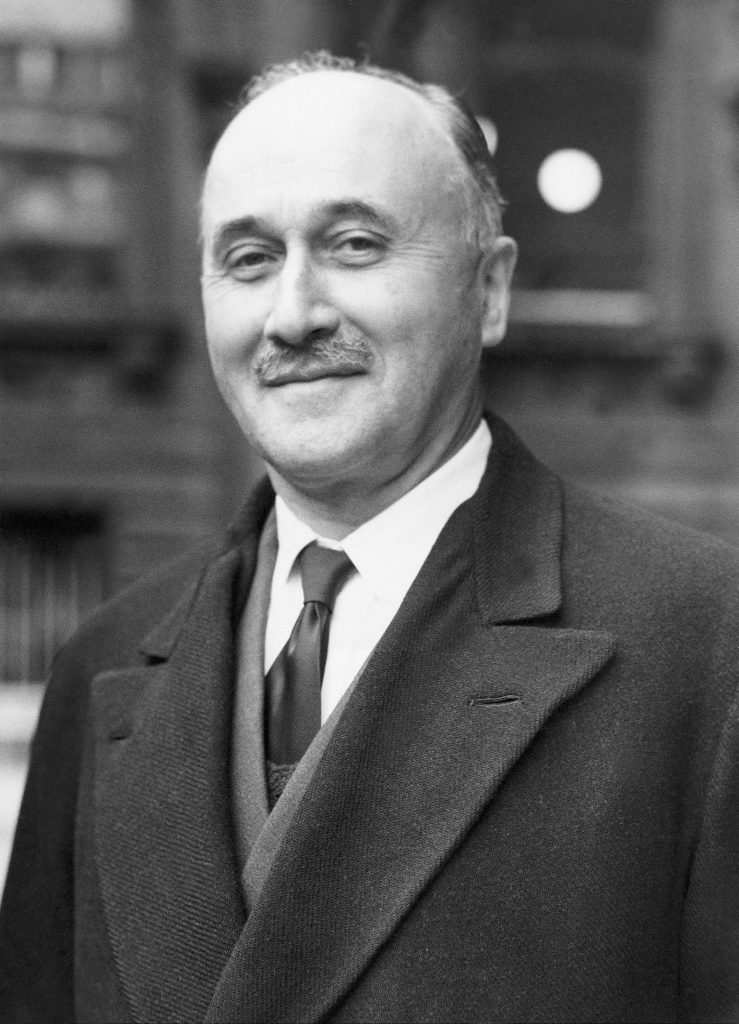
The man whose name is associated with the European integration was born in Cognac, France 125 years ago.
Monnet’s family was in the trading business. His first lessons in human and international relations took place not in a classroom but through his travels across the globe. He began traveling at the age of sixteen to serve the family business.
Monnet was prevented from serving his country during WWI for health reasons. He thus sought to serve his country in other ways. Monnet proposed the creation of a common allied council to coordinate the sourcing and transport of war resources. This idea was unanimously accepted.
Due to his effectiveness during the war Monnet was named Deputy Secretary General of the League of Nations, the predecessor of the United Nations, upon its creation in 1919, at the age of thirty-one. In 1923, after four years of service and growing frustration with the ineffectiveness of the decision making process, Monnet resigned from the League.
In December of 1939 Monnet became the president of a Franco-British committee set up to coordinate the combining of the two countries’ production capacities.
In August of 1940, Monnet was sent to the United States as a member of the British Supply Council, in order to negotiate the purchase of war supplies. Shortly after his arrival in Washington, he became one of President Franklin Delano Roosevelt’s most trusted advisors.
In 1943 Monnet became a member of the French Committee of National Liberation, the de facto French government in exile in Algiers.
During a meeting of this committee on August 5th, 1943, Monnet declared: “there will be no peace in Europe, if the states are reconstituted on the basis of national sovereignty… The countries of Europe are too small to guarantee their peoples the necessary prosperity and social development. The European states must constitute themselves into a federation.”
He was the main instigator of the Victory Program of the Allies, while the renowned economist Keynes wrote that the contribution of Monnet shortened the Second World War by one year.
After the war was over, General de Gaulle entrusted Monnet with the financial planning of postwar France as well as the modernization of industry and agricultural resources for the Marshall Plan.
Thoughts about political integration arose early on because of the large U.S. influence in Western Europe, which manifested itself through the Marshall Plan and NATO. In 1950, observing the international tensions, Jean Monnet was convinced that the time had come to attempt a step towards the unification of European countries, his dream of a European Community. On May 9th 1950, after consulting Monnet, Robert Schuman made a declaration in the name of the French government, a proposal that was to forever change the course of Europe and eventually become the European Union that exists today.
The Schuman Plan, of which Jean Monnet was the mastermind, was officially announced on May 9th, 1950. It laid the foundations for the creation of the European Coal and Steel Community (ECSC) in 1951. The role of the ECSC, of which Monnet was the first president, was the management of the market in coal and steel – the main raw materials of the war industry – between traditional enemies, France and Germany. They were later joined by Italy and the countries of Benelux. Monnet believed that only a common market for European products could create the conditions for growth after the war-damaged economies. The success of the ECSC led the “six” to extend their cooperation by signing the Treaty of Rome in 1957 which established two new communities: the European Atomic Energy Community (EAEC), which places an importance on the peaceful use of atomic power in the ECSC and the most advanced European Economic Community (Common Market), which was the first form of customs union between the “6” states and was based on “four freedoms” (free movement of goods, services, capital and people).
Until the very last days of his life, Jean Monnet believed that the European nations had to unite in order to survive. “Continue, continue. There is no future for the people of Europe except a united one” he repeated this throughout his entire life. Monnet always had one goal: “Make people work together, show them that beyond their differences and geographic boundaries lies a common interest”.
The only vision Monnet was not able to bring to life was the European Defense Community.
Jean Monnet was a man of action and peace. He once said that: “there are two categories of people: those who want to be something and those who want to do something”. Monnet chose to be the latter.
M.K.S.